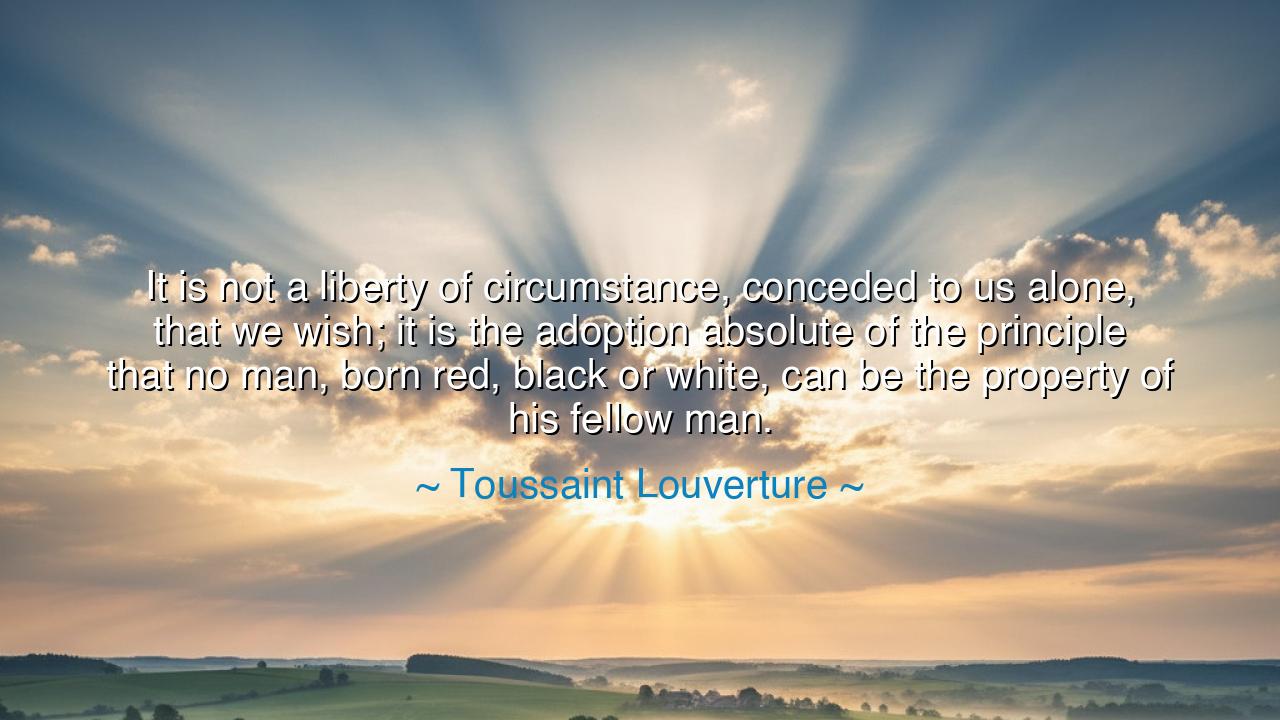
It is not a liberty of circumstance, conceded to us alone, that
It is not a liberty of circumstance, conceded to us alone, that we wish; it is the adoption absolute of the principle that no man, born red, black or white, can be the property of his fellow man.






"It is not a liberty of circumstance, conceded to us alone, that we wish; it is the adoption absolute of the principle that no man, born red, black or white, can be the property of his fellow man." These words by Toussaint Louverture, a leader of the Haitian Revolution, ring out with a profound call to freedom, justice, and human dignity. At the heart of this statement lies a universal truth: true liberty is not a gift bestowed upon the few by the will of the powerful, but a right inherent in every human being. Liberty is not to be dictated by circumstance, race, or the will of oppressors; it is the foundation of humanity itself. Louverture's words reflect the very heart of the fight for freedom, a fight that transcends borders and nations, for it is the principle of equality and inherent human dignity that he champions.
The ancient Greeks, in their pursuit of justice and virtue, also grappled with the nature of freedom. Socrates, for instance, questioned the nature of power and authority, seeking to understand what truly makes a person free. His discussions on the nature of the soul, ethics, and the ideal state emphasized that freedom was not a mere external condition but an internal quality—the ability to live with honor and self-determination, unshackled by unjust rulers. Just as Socrates questioned the prevailing systems of his time, Toussaint Louverture did the same, asserting that no human being—regardless of race—should ever be reduced to the status of property, as was the practice in the brutal institution of slavery. His words challenge the prevailing notions of the time, just as the philosophers of Athens once challenged the beliefs of their society.
Louverture’s struggle, much like that of Spartacus—the gladiator who led a massive rebellion against Rome—was not merely a fight for freedom in a political sense, but a moral and spiritual battle against the dehumanization of individuals. Spartacus, born into slavery, sought to break the chains that bound him and his people, rising up against a system that valued men as mere tools of labor and tools of oppression. His rebellion, though ultimately unsuccessful in the short term, left a lasting legacy: it reminded the Roman world that freedom is a right for all, not a privilege granted by the conqueror. Similarly, Louverture's leadership in the Haitian Revolution was rooted in the moral conviction that no man—black, red, or white—could ever be the property of another. It was an assertion of the inherent worth of every human being.
Through his leadership, Louverture achieved a monumental victory: Haiti became the first nation in the Americas to abolish slavery and gain independence. In the midst of colonial oppression and racial violence, Louverture became a symbol of resilience and hope for oppressed peoples around the world. But his fight was not simply for freedom in the traditional sense—it was a fight for the recognition of human dignity. To Louverture, the end of slavery was not just a political goal; it was a spiritual and moral imperative, a demand that the human soul be respected and treated as equal, regardless of race or origin. His battle was a testament to the power of principles over circumstances, a call to arms that transcended the narrow view of liberty granted only to a few.
In reflecting on Louverture’s vision, we see the profound wisdom he offers for all generations. He teaches that true freedom is not a temporary concession from the ruling class; it is a right rooted in the very nature of human beings. It is a universal principle that applies to every individual, regardless of race or background. Just as Socrates or Plato might have argued that justice is universal, Louverture’s call for equality mirrors this ancient understanding. Liberty cannot be granted by the will of the few; it must be claimed by the many, through courage and a deep understanding of human dignity. It is not enough for a society to simply remove the chains of physical enslavement; true freedom lies in the recognition of each individual’s inherent worth.
The lesson from Louverture's words is clear: to be truly free, we must adopt the absolute principle that no one can ever be owned by another. This principle transcends race, religion, or social standing—it is a call to equality, justice, and respect for all human beings. In our own lives, we must recognize that freedom is not simply a legal or political right; it is a moral and spiritual commitment to the inherent dignity of others. The fight for freedom, as Louverture shows, is not a struggle against one group or another, but a fight to affirm the right of all to live with dignity and respect. This moral revolution must begin in our hearts, in the way we treat each other, and in the actions we take to challenge systems of oppression wherever they are found.
In practical terms, we can follow Louverture’s example by standing up against injustice in all its forms—whether it be racial discrimination, economic exploitation, or social inequality. Let us also live with integrity, honoring the principles of freedom and equality in our daily actions. When we encounter oppression, let us do as Louverture did: resist, not only with strength but with a deep moral clarity that transcends the external circumstances of our time. In doing so, we continue the eternal struggle for justice, and in the process, we honor the legacy of those like Louverture, who fought to ensure that all might one day stand free.






AAdministratorAdministrator
Welcome, honored guests. Please leave a comment, we will respond soon